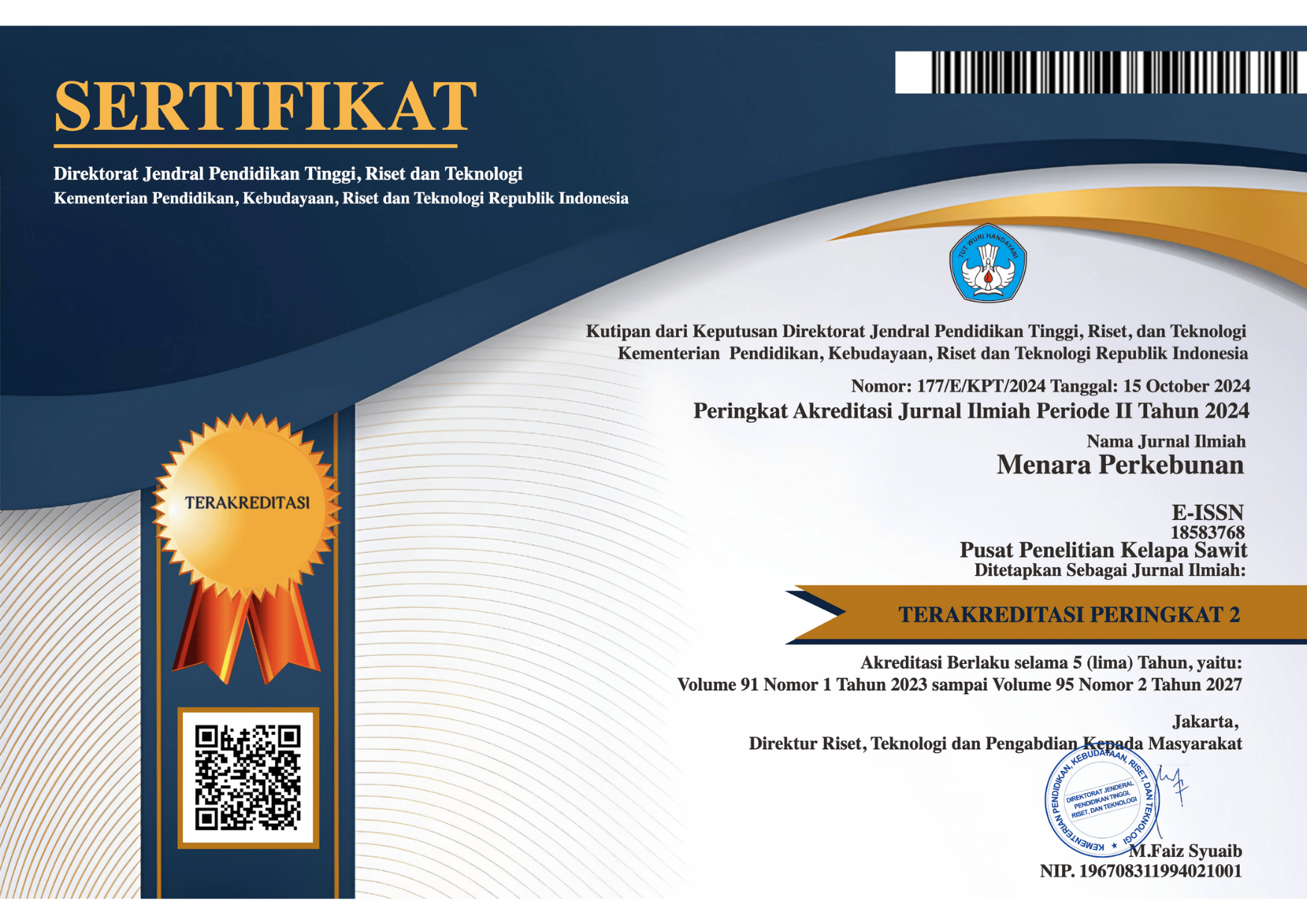Pemurnian diasilgliserol dari produk gliserolisis minyak sawit mentah dengan kromatografi kolom Purification of diacylglycerol from glycerolysis products of crude palm oil using column chromatography
DOI:
https://doi.org/10.22302/iribb.jur.mp.v79i1.71Keywords:
Vegetable oil, lipase enzyme 1, 3-glyceride, CPO, diacylglycerolAbstract
Abstract
Vegetable oil enriched with diacylglycerol (DAG) is
known as healthy oil. This oil is much more expensive than
cooking oil. Production of DAG could be performed by
glycerolysis process of CPO using specific lipase of 1,3-
glyceride from Rhizopus oryzae mold. Product derived from
glycerolysis process of CPO is a mixture of DAG, mono-
acylglycerol (MAG), free fatty acid (FFA) and residual of
unglycerolysed triacylglyserol (TAG). Therefore the DAG
product has to be isolated from other components in order to
get high purity of DAG. The objective of the research was to
purify and to find out optimal concentration of DAG derived
from a mixture product of CPO glycerolysis at laboratory
scale experiment (total reactant for glycerolysis was
93.8 mL) and semipilot scale experiment (10 times of
laboratory scale) using column chromatography with silica
gel as stationary phase. The research showed that the
highest DAG content could be collected at fraction of 26 th i.e
65%, while at semipilot scale experiment the highest content
of DAG (97%) was achieved at 64 to 66th fraction.
Reglycerolysis of residual CPO only yielded 8.24%
glycerolysis product which was much lower than that of the
first glycerolysis reaching 46.67%. The highest DAG derived
from the second reglycerolysis product was achieved at 24 th
fraction reaching 35.71 % .
Abstrak
Minyak nabati kaya kandungan diasilgliserol (DAG)
dikenal sebagai minyak sehat (healthy oil). Minyak ini jauh
lebih mahal dari minyak makan biasa. Produksi DAG dapat
dilakukan dengan proses gliserolisis CPO menggunakan
enzim lipase spesifik 1,3-gliserida dari kapang Rhizopus
oryzae. Produk gliserolisis CPO triasilgliserol adalah
campuran DAG, monoasilgliserol (MAG) dan asam lemak
bebas (ALB) serta residu triasilgliserol (TAG) yang tidak
tergliserolisis. Oleh karena itu DAG yang terbentuk harus
dipisahkan dari komponen lainnya agar diperoleh fraksi DAG
dengan kemurnian tinggi. Penelitian ini bertujuan untuk
memurnikan dan menetapkan konsentrasi DAG yang dapat
diperoleh dari gliserolisis CPO skala lab (total reaktan
93,8 mL) dan skala semipilot (10 kali skala laboratorium)
dengan kromatografi kolom menggunakan fase padat silika
gel. Residu TAG dari gliserolisis pertama digunakan untuk
gliserolisis kedua atau gliserolisis ulang. Hasil penelitian
menunjukkan bahwa fraksi DAG dengan konsentrasi
tertinggi diperoleh pada fraksi ke-26 yaitu sebesar 65%,
sedangkan pada percobaan dengan skala semipilot (10 kali
skala laboratorium) diketahui bahwa konsentrasi DAG
tertinggi (97%) diperoleh pada fraksi ke-64 sampai dengan
ke-66. Gliserolisis kedua dari residu CPO hanya mampu
menghidrolisis TAG menjadi campuran DAG, MAG dan
ALB sekitar 8,24%, lebih kecil dari reaksi gliserolisis
pertama yaitu sebesar 46,67%. DAG tertinggi yang berhasil
dikumpulkan dari produk gliserolisis kedua adalah pada
fraksi ke-24 yaitu sebesar 35,71% .
Downloads
Downloads
Submitted
Accepted
Published
How to Cite
Issue
Section
License
Copyright (c) 2016 Jurnal Menara Perkebunan

This work is licensed under a Creative Commons Attribution 4.0 International License.
Authors retain copyright and grant the journal right of first publication with the work simultaneously licensed under a Creative Commons Attribution License that allows others to share the work with an acknowledgement of the work's authorship and initial publication in this journal.













